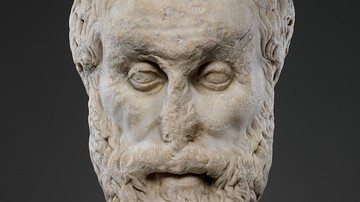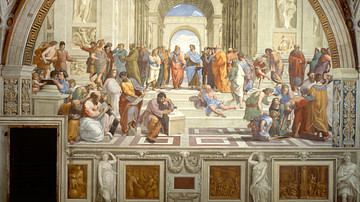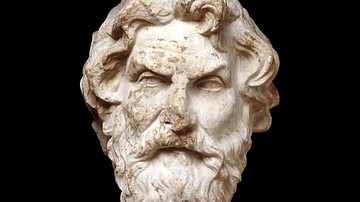
Protagoras of Abdera (l. c. 485-415 BCE) is considered the greatest of the Sophists of ancient Greece and the first philosopher in the West to promote Subjectivism, arguing that interpretation of any given experience, or anything whatsoever, is relative to the individual. This same view was earlier promoted by the Chinese relativist philosopher Teng Shih (l. c. 500 BCE).
Protagoras was the first to teach relativistic philosophy in Greece through his position as a Sophist. A Sophist was a teacher of rhetoric, politics, and logic who served as a private tutor to the youth of the upper classes and Protagoras was among the most popular and highly paid. Greece generally, but Athens especially, was extremely litigious and the courts heard countless lawsuits on a daily basis. The ability to persuade a jury to accept one's side of an argument and reject opposing claims was highly valued and this was among the skills the sophists offered to teach, for a price.
Protagoras is best known for the phrase often translated as "man is the measure of all things" by which he meant that everything is relative to individual interpretation. A room will feel cold to someone used to warmth and seem warm to someone coming in from the cold and, in Protagoras' view, both are correct. In this same way "right" and "wrong" are labels people use based on their own experience and interpretation and, finally, are only opinions. There is no ultimate "right" or final "wrong" because there is no final Truth which could give values to these definitions.
Protagoras' claims were countered by Plato (l. 428/427-348/347 BCE) who maintained that there had to be an ultimate Truth in order to inform those definitions and values which people held to be true. If there was no Truth then, as Protagoras claimed, every argument over right or wrong was simply opinion and, further, laws and social customs were rendered meaningless. Plato devoted an entire dialogue (the Protagoras) to refuting the relativist view but, it could be argued, the entire corpus of his work is essentially devoted to proving Protagoras wrong.
Protagoras the Sophist
Sophists taught people, particularly young men, the finer points of culture and how to speak well (giving rise to the English word `sophisticated'). As Greece, particularly Athens, was extremely litigious, a knowledge of the art of public speaking was greatly valued as a means of defending one's self in court or prosecuting someone else. There were no professional lawyers in ancient Greece and, therefore, it was up to the individual involved in a case of law to hire a professional speech writer and then be able to deliver that speech eloquently.
According to ancient writers, Protagoras chiefly made his living by coaching wealthy youth in the art of rhetoric for use in the courtroom. A great deal of what we know of Protagoras' life and teachings comes from two of Plato's dialogues, the Protagoras and the Theaetetus, in which he is presented unfavorably. Professors Forrest E. Baird and Walter Kaufmann comment:
Plato considered it his task to oppose these men, and since his dialogues survived and most of their writings did not, his highly polemical pictures of the Sophists have been widely accepted as fair portraits. The very name `Sophist' has become a reproach. Yet one should not uncritically accept Plato's image of the Sophists. Although many disagree with Sophist conclusions, their questioning of conventions, especially in ethics, and their critique of the limits of knowledge represent a milestone in the history of thought. (43-44)
Protagoras is best known for his claim that, "Of all things the measure is Man, of the things that are, that they are, and of the things that are not, that they are not" or, in other words, that everything is relative to individual experience, judgement, and interpretation. This thought is often phrased as "man is the measure of all things" or "everything is relative". This claim, it is thought, was of particular use in court where a prosecutor or defendant could employ relativistic reasoning to win a case.
For example, if Person A claimed that Person B had wronged them by taking a goat from their yard, and Protagoras was coaching, or even representing, Person B, he might answer the charge by stating that Person A perhaps believed that the goat belonged to him but, as Person B was making the same claim, and lacking any physical evidence, there was no way of verifying Person A's belief. If Person A called witnesses to provide such verification, they would be met with Protagoras' skepicism since they were clearly biased in favor of Person A. The case would be won by introducing enough doubt into the minds of the jurors to decide in favor of Person B. The actual truth regarding who the goat belonged to or whether Person B had, in fact, stolen it did not matter to Protagoras because there was no "truth" beyond what an individual defined that concept as being.
Protagoras' Relativism
In philosophy, `relativism' is the belief that there is no final, objective truth, and Protagoras may be regarded as the first known relativist in Western culture. Plato, of course, believed in an objective standard of truth which everyone needs to apprehend and acknowledge in order to live a fulfilling, satisfied, and productive life. He was, therefore, at great odds with the philosophy of Protagoras. Professors Baird and Kaufmann write, "Plato takes Protagoras to mean that each person, not humanity as a whole, is the measure of all things and so attacks Protagoras's relativism" (43). It may be, however, that Protagoras was simply making use of ideas first espoused by the earlier Greek philosopher Xenophanes of Colophon (l.c. 570-478 BCE) who emphasized the limitations of human knowledge.
Xenophanes writes, "No man knows or ever will know the truth about the gods and about everything I speak of; for even if one chanced to say the complete truth, yet oneself knows it not but seeming is wrought over all things" (DK21B38). Xenophanes is here saying that, owing to the subjective nature of human interpretation and understanding, even if an individual were to uncover the truth about the gods, one would not be able to realize that truth because `seeming', our subjective understanding, clouds and distorts such a possibility.
Protagoras seems to be saying something much along the same lines when he writes:
About the gods, I am not able to know whether they exist or do not exist, nor what they are like in form; for the factors preventing knowledge are many: the obscurity of the subject and the shortness of human life. (Baird & Kaufmann, 44)
This line also mirrors another of Xenophanes' thoughts concerning knowledge of the gods in which the elder philosopher claimed that one could only approach such knowledge through seeking after it and, even then, would only be able to apprehend a shadow.
Protagoras' famous relativism, then, could have originally been a simple empirical observation concerning the human condition and not `relativism' at all in that he may never have claimed `truth' or the `gods' did not exist, merely that there is no way of objectively defining what those things might be. Everyone, according to Protagoras, will interpret the truth individually, and this has been understood to mean that if someone claims there is no God, then there is no God for that person. While Plato asserts that this is what Protagoras believed and taught, it cannot be stated with certainty as only fragments of Protagoras' work have survived. His tutelage of the youth of Athens and skill at litigation is understood as probable based on what has been written of him and the behavior of sophists generally but, still, amounts to hearsay.
Protagoras & Plato's Objectivism
Whatever motivation or inspiration Protagoras may have been working from, his ideas were antithetical to Plato's Objectivism, and the latter has done much to make him appear foolish. In his dialogue of the Theaetetus, Plato has the character of Socrates say,
[Protagoras] says, doesn't he, that what is believed by each person is so for him who believes it?...Well, gratifying as it is to be told that what each of us believes is true, I am surprised that he does not begin his Truth by saying that of all things the measure is the pig, or the dog-faced baboon...If what each man believes to be true through sensation is true for him - then how, my friend, was Protagoras so wise that he should consider himself worthy to teach others and for huge fees? And how are we so ignorant that we should go to school to him if each of us is the measure of his own wisdom?(161B)
While it seems clear that Protagoras did hold to this relativistic philosophy, it is not known whether he made his money teaching these concepts as philosophical truths. It is likely, again, that he used his paradigm of an individual alone being able to apprehend separate truths and realities to teach his students how to win court cases by "making the worse appear to be the better cause", as Plato phrases it in his dialogue of the Apology.
The First Greek Free Thinker
Protagoras was considered at least an agnostic and, perhaps, an atheist based upon his teachings and his claim concerning the existence of the gods. His departure from the standard way of viewing religious and ethical subjects was only one aspect of his overall shift away from the earlier Greek Pre-Socratic philosophers and their focus on natural philosophy to one which questioned the basics of perception and what it meant to be a human being.
His 'Man is the Measure' claim has been cited by many through the ages as the first and best statement of human relativism and he has also been hailed as an early 'humanist' and 'free thinker'. His influence on later philosophers has been vast in that any great thinker who followed him has had to at some point grapple with his simple assertion that nothing is true which is not true to an individual and an Objective Truth, able to be apprehended the same way by all, does not exist.
This relativism so bothered Plato that the latter devoted an enormous amount of time and effort in his writings to refuting the idea that anything can be true as long as it is believed to be true by the individual. Plato's theory of Forms (that what we see and call 'true' is but a reflection of a higher Truth) is a direct response to Protagoras' earlier relativistic claim, in that Plato was trying to prove there had to be some standard of truth by which one could objectively recognize what was right and what was wrong, true or false. Plato's body of work may, in fact, be read as one long refutation of Protagoras' famous assertion.
Death & Legacy
Protagoras was accused of impiety when he was seventy years old in c. 415 BCE; a charge in ancient Greece which carried a penalty of death. This was the same charge, which amounted to denying the traditional gods of Greece and promoting atheism, later leveled against Socrates in 399 BCE and which led to his execution. Many people were routinely charged with impiety and were able to pay a fine or otherwise escape prosecution but Protagoras chose, instead, to leave Athens before he could be brought to trial. He drowned at sea while trying to reach the Greek colony at Sicily.
Although his relativism was repeatedly, and brilliantly, refuted by Plato and those who followed him, Protagoras' thought continues to resonate and intrigue people in the present day. In spite of all the rational, objective, critiques of Protagoras' central claim, the concept of everything as relative to individual interpretation is impossible to completely refute. Protagoras lay the foundation in the West for questioning the most fundamental ideas about reality and perception in suggesting that the world one person sees may be radically different from the one their neighbor is experiencing.








